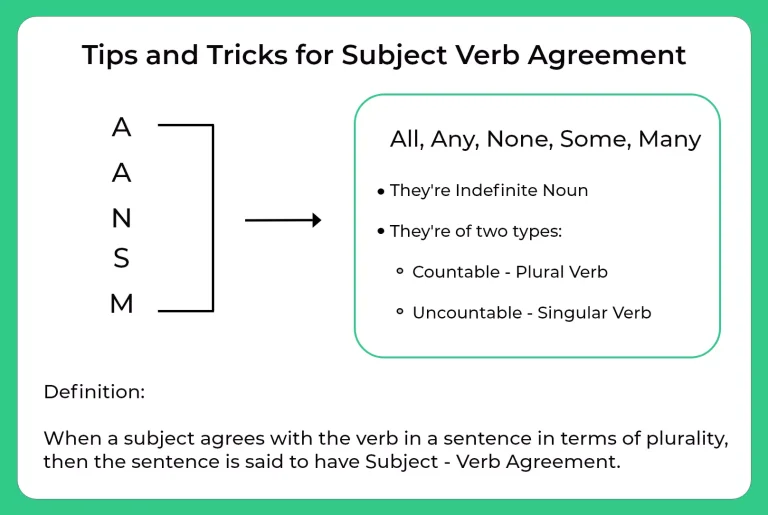Verbal Menu
- Basic Grammar
- Speech and Voices
- Tenses
- Articles
- Tenses and Articles
- Idioms and Phrases
- Subject Verb Agreement
- Prepositions and Conjunction
- Selecting Words
- Relative Pronoun
- Sentence Completion
- Sentence Ordering
- Contextual Vocabulary
- Jumbled Sentence
- Sentence Formation
- Error Identification
- Sentence Improvement and Construction
- Cloze Test
- Fill in the blanks
- Paragraph Ordering
- Para Jumbles
- Synonyms and Antonyms
- Synonyms
- Antonyms
- Reading Comprehension
- Get Off-campus Drive Updates
- Get Hiring Updates
- Contact US
PREPINSTA PRIME
Tips And Tricks And Shortcuts On Subject-Verb Agreement
Tips and Tricks and Shortcuts For Subject Verb Agreement
Just knowing the basics won’t help you need to know the Tips and Tricks and Shortcuts for Subject Verb Agreement too.
Subject-verb agreement is an extremely basic segment of the English language. It means that the subject should agree with the verb in a sentence.
The key here is to check whether the verb agrees with the subject in terms of both number and person. However, these questions sometimes get tricky when it comes to certain thrown-up elements in a sentence.

Tips and Tricks and Shortcuts For Subject-Verb Agreement
Tip 1- Indefinite Pronouns are considered singular and require a singular verb.
- List of Indefinite Pronoun.
- anybody,
- anyone,
- no one,
- nothing,
- something,
- whatever,
- whoever.
- Example –
- Everybody wants to party after the class
- Nothing seems to go right when you are sad and angry
- Whoever comes to the meeting will be honored
Tip 2- Depending on usage Indefinite pronoun may be singular or plural. There is basically 5 indefinite Noun.
- Indefinite pronoun AANSM ( All, Any, None, Some, Must/More).
- You can use fingertips AANSM to remember 5 indefinite pronouns.
- Countable Noun Example
(i) Many of the ladies are going out.
(ii) Most of the students were doing a party at the annual function.Here we can see in both cases ladies and students are plural and verbs also are and were.
- Uncountable Noun Example
(i) At the party, some regulation is needed
(ii) Love is an extraordinary feeling.Here in both cases, we can see that limitation and love are uncountable nouns, hence we consider these are a singular form of verbs.
Tip 3- Verbs between singular and plural noun
The most common mistake people that people do is confuse the subject and the predicate which leads to a verb confusion. Let’s see a few examples:
Example (1)
- Wrong- Sana’s necklace were shiny objects.
- Correct- Sana’s necklace has shiny objects
Here, the confusion between necklace and objects is real. However, the subject here is the necklace which will decide the verb.
Example (2)
- Wrong – the reporter along with few cameramen are present at the conference
- Correct – the reporter along with few cameramen is present at the conference
Here, the confusion may be with the report or the cameramen. While the subject is the reporter, the verb will be singular as well.
Every complete sentence contains two parts: a subject and a predicate.
The subject is what (or whom) the sentence is about, while the predicate (verb) tells something about the subject.

Subject-Verb Agreement Shortcuts
| Shortcut | Description |
|---|---|
| Rule of Proximity | In “either…or” / “neither…nor”, the verb agrees with the subject closer to it. Example: Neither the teacher nor the students are present. |
| Ignore Prepositional Phrases | Skip phrases like “along with,” “as well as,” etc. The verb agrees with the main subject. Example: The teacher, along with the students, was late. |
| Inverted Sentences | In “There is” or “Here are” sentences, find the real subject after the verb. Example: There are many books on the shelf. |
| Collective Nouns | Treat them as singular when acting as a single unit. Example: The team is winning the match. |
| Indefinite Pronouns | Words like “nothing,” “everything,” “anyone” take singular verbs. Example: Everything is fine now. |
Easy Shortcuts and Tricks to Solve Subject-Verb Agreement Questions
- Focus on the Real Subject
Ignore extra words between the subject and verb.- Wrong: The box of chocolates are tasty.
- Right: The box of chocolates is tasty. (“Box” is the real subject)
- Words Like “Everyone, Someone, Nobody” Are Always Singular
These look plural but are treated as singular.- Wrong: Everyone know the answer.
- Right: Everyone knows the answer.
- “Either…or” / “Neither…nor” – Match the Nearest Subject
The verb agrees with the subject that is closest to it.- Wrong: Either the students or the teacher are present.
- Right: Either the students or the teacher is present.
- Wrong: Neither the teacher nor the students is here.
- Right: Neither the teacher nor the students are here.
- Ignore Words Like “With,” “Along with,” “As well as”
These do not make the subject plural.- Wrong: The boy, along with his friends, are coming.
- Right: The boy, along with his friends, is coming.
- Titles, Books, and Countries = Singular
Even if they sound plural, treat them as one.- Wrong: “The Chronicles of Narnia” are interesting.
- Right: “The Chronicles of Narnia” is interesting.
- Wrong: The United States are powerful.
- Right: The United States is powerful.
- Uncountable Nouns Always Take Singular Verbs
Milk, sugar, advice, information, and luggage are treated as singular.- Wrong: The luggage are heavy.
- Right: The luggage is heavy.
- Use “Does” for Singular and “Do” for Plural
“Does” goes with he, she, it. “Do” goes with I, you, we, they.- Wrong: He do his homework daily.
- Right: He does his homework daily.
- Wrong: They does their homework.
- Right: They do their homework.
- Time, Money, and Distance = Singular as a Unit
These are treated as one single item or measurement.- Wrong: Ten kilometers are a long distance.
- Right: Ten kilometers is a long distance.
- Wrong: Five hundred rupees are enough.
- Right: Five hundred rupees is enough.
- Collective Nouns = Usually Singular
Words like team, jury, family take singular verbs if acting as one group.- Wrong: The team are winning.
- Right: The team is winning.
- Gerunds (Verb + ing) = Always Singular
When a verb is used as a noun (gerund), the verb is singular.- Wrong: Reading books help you relax.
- Right: Reading books helps you relax.
- Wrong: Swimming keep you fit.
- Right: Swimming keeps you fit.
Most Common Mistakes Students Make
| Mistake | Correct Form |
|---|---|
| The group of players are ready. | The group of players is ready. |
| One of the boys have a pen. | One of the boys has a pen. |
| Neither John nor James are going. | Neither John nor James is going. |
| Each of the teachers have a laptop. | Each of the teachers has a laptop. |
| The jury are divided. | The jury is unanimous. |
Prime Course Trailer
Related Banners
Get PrepInsta Prime & get Access to all 200+ courses offered by PrepInsta in One Subscription
Sample Questions
Question 1.
Fill the correct form of the verb in the blank:
The woman and her husband ____ to the same tribe.
- Belong
- Belongs
- Belonging
- are belong
Correct Answer: A
Explanation:
Since the two subjects are joined by ‘and’ the verb will be plural – Belong.
Question 2.
Detect error in the below sentence:
Everyone _____ to stand up when the Principal comes.
- Needs
- Need
- Needing
- None of the above
Correct Answer: A
Explanation:
According to the rules, if a sentence has a word like ‘everyone;, ;each; etc, it will be considered singular. Hence, needs.
Question 3.
Replace the underlined word by choosing the correct option:
A large amount of money were deducted from the account.
- has
- have
- was
- none
Correct Answer: C
Explanation:
The noun here is uncountable, as we are not sure how much money is deducted. Therefore, “was” should be used instead of “were.”
Question: 4
Detect the error in the below sentence:
The students, as well as their parents, _______ excited about an annual gathering.
- Is
- Are
- Were
- Was
Correct Answer: B
Explanation –
The complete and correct sentence will be The students, as well as their parents, are excited about an annual gathering. When a phrase comes between the subject and the verb, remember that the verb still agrees with the subject, not the noun or pronoun in the phrase following the subject of the sentence.
Question: 5
Each of the volleyball players _____ willing to be recorded while they were playing.
- Were
- Was
- Is
- are
Correct option: B
Explanation –
The complete sentence will be – Each of the participants was willing to be recorded. Here ‘was’ is used as per the sentence in the past tense.
Also Check Out
Also Check:
- Basic Grammar – Questions | Rules | How to Solve Quickly | Tricks & Shortcuts
- Speech and Voices – Questions | Rules | How to Solve Quickly | Tricks & Shortcuts
- Tenses – Questions | Rules | How to Solve Quickly | Tricks & Shortcuts
- Tenses and Articles – Questions | Rules | How to Solve Quickly | Tricks & Shortcuts
- Idioms and Phrases – Questions | Rules | How to Solve Quickly | Tricks & Shortcuts
- Subject Verb Agreement – Questions | Rules | How to Solve Quickly | Tricks & Shortcuts
- Prepositions and Conjunction – Questions | Rules | How to Solve Quickly | Tricks & Shortcuts
- Selecting Words – Questions | Rules | How to Solve Quickly | Tricks & Shortcuts
- Relative Pronoun – Questions | Rules | How to Solve Quickly | Tricks & Shortcuts
- Sentence Completion- Questions | Rules | How to Solve Quickly | Tricks & Shortcuts
- Basic Grammar
Questions
Rules
How to Solve Quickly
Tricks & Shortcuts - Speech and Voices
Questions
Rules
How to Solve Quickly
Tricks & Shortcuts - Tenses
Questions
Rules
How to Solve Quickly
Tricks & Shortcuts - Tenses and Articles
Questions
Rules
How to Solve Quickly
Tricks & Shortcuts - Idioms and Phrases
Questions
Rules
How to Solve Quickly
Tricks & Shortcuts - Subject Verb Agreement
Questions
Rules
How to Solve Quickly
Tricks & Shortcuts - Prepositions and Conjunction
Questions
Rules
How to Solve Quickly
Tricks & Shortcuts - Selecting Words
Questions
Rules
How to Solve Quickly
Tricks & Shortcuts - Relative Pronoun
Questions
Rules
How to Solve Quickly
Tricks & Shortcuts - Sentence Completion
Questions
Rules
How to Solve Quickly
Tricks & Shortcuts
Get over 200+ course One Subscription
Courses like AI/ML, Cloud Computing, Ethical Hacking, C, C++, Java, Python, DSA (All Languages), Competitive Coding (All Languages), TCS, Infosys, Wipro, Amazon, DBMS, SQL and others

 Apply For Jobs
Apply For Jobs Get Hiring Updates
Get Hiring Updates




Login/Signup to comment